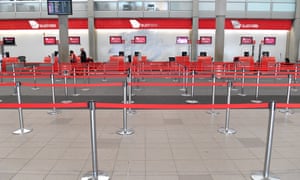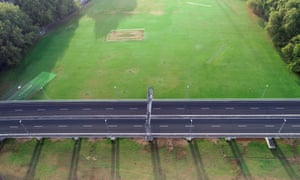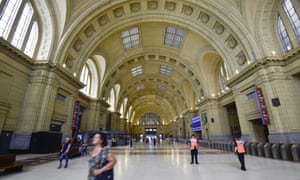Health workers in Spain have been acknowledging the cleaning staff, who have been working around the clock to keep hospitals and facilities as safe as possible.
Josep Goded
(@josepgoded)The cleaning staff at our hospitals are hardly ever mentioned and they also deserve a tribute!pic.twitter.com/25ij79UtIs
Australian economic stimulus package: how much governments have committed to coronavirus crisis
The $130bn support package announced by the Morrison government on Monday is the largest plank in a raft of measures to keep Australians in jobs and support those out of work, unprecedented in its scale.
Every state and territory has announced stimulus packages that, along with the impact of Covid-19-related closures on their revenue, are expected to put them all in deficit.
By the end of March, the measures announced totalled AU$213.6bn (US$132bn) in direct, on-budget spending from the federal government, $11.8bn from the states and $105bn in lending from the Reserve Bank and the federal government.

In more airlines news, Virgin Australia has come out of its trading halt – and soared 10% – after telling the ASX it has indeed asked for a $1.4bn loan from the government.
The loan could be convertible to shares, part-nationalising the airline, Virgin told the ASX.
It confirmed the Australian’s initial report on the request, published this morning, saying it “continues to explore a range of options to manage through the Covid-19 crisis, including requesting financial support from the Australian government in the order of AU$1.4bn (US$870m) as part of a broader industry support package to prepare for a prolonged crisis”.
Shares in rival Qantas, which has lobbied against a bailout for Virgin and reportedly wants AU$2.4bn for itself, also rose 4%.
Updated
A New Zealand epidemiologist has told a committee of lawmakers who are scrutinising the government’s pandemic response that “A lock down on its own is not enough.”

“It’s like pressing the pause button on your device,” David Skegg, an emeritus professor of epidemiology at the University of Otago, said of the four-week national lockdown that began last Wednesday.
He was speaking to a New Zealand parliamentary committee convened to question and hold to account government and public officials for their decisions on the Covid-19 pandemic. It is chaired by the leader of the opposition and features lawmakers from every political party in parliament.
647 cases of coronavirus have been recorded in New Zealand; 14 people are in hospital with the virus, including two in intensive care, and one person has died.
The government has drawn widespread praise for its decision to shut down the country and ask the public to stay home. But Skegg said the move would be a “terrible waste” unless the government added to it with these four measures:
- Ensure the lockdown is as comprehensive as possible to minimise person-to-person spread. “Are all of those essential industries really essential?” Skegg asked, of the businesses allowed to remain open.
- Every effort must be made to prevent spread by New Zealanders returning from overseas. These travellers are being quarantined in hotels and motels, though there have been some reports of those quarantined being allowed out to buy their own groceries — which is not allowed.
- Far more testing. Skegg said loosening of rules around testing — which no longer require patients to have traveled overseas or have come into contact with a confirmed case — haven’t got through to doctors in the field.
- The capacity for rapid case contract tracing must be greatly expanded as a matter of urgency, Skegg said.
The epidemic committee was held by video call, with a live stream broadcast publicly and available to watch on social media and many news outlets. As with any group of people holding a Zoom meeting, there was the occasional person speaking with bizarre echoing feedback, although only one lawmaker asking a question had to be reminded to un-mute his microphone.
Anger as Las Vegas turns parking lot into sleeping area for homeless
Images of homeless people sleeping in a converted parking lot in Las Vegas have sparked criticism, even as the city officials describe an “emergency situation” and say the solution was the best option after another shelter was forced to close amid the coronavirus crisis.
Over the weekend, authorities in Las Vegas needed to find additional sleeping space for the city’s sizable homeless population when a 500-bed overnight shelter closed after a client tested positive for the new coronavirus.
Officials turned a parking lot into a makeshift shelter, saying spaces for sleeping were drawn 6ft apart in observance of federal social distancing guidelines.
Many white boxes were covered up with blue mats that could be more easily cleaned. But photos of the temporary shelter showing people sleeping close to each other on the ground, some within arm’s reach, sparked backlash on social media.
A Mancino-Williams
(@Manda_like_wine)Nevada, a state in one of the richest countries in the world, has painted social-distancing boxes on a concrete parking lot for the homeless to sleep in. pic.twitter.com/svNJ0N9r3f
Updated
Quarantined Argentinians burst into a noisy clamour, banging pots and pans from their windows and balconies on Monday night, demanding politicians and public officials cut their wages to aid in the coronavirus effort.

The call to protest, launched on Twitter, Facebook, Instagram and WhatsApp, had wide repercussion, especially in the capital city of Buenos Aires and the large city of Córdoba in central Argentina.
Gabriela Inglese ✨
(@GabrielaInglese)Sigue el #Cacerolazo en #Palermo pic.twitter.com/Ea9Zfltadd
“Politicians should cut their wages in half, we would have six billion dollars for the fight against coronavirus,” read the social media messages. The pot banging launched at 9.30pm, following the nightly 9pm clapping and cheering for health workers at the forefront of the coronavirus battle.
The call to pot banging came after the government of president Luis Lacalle Pou in neighbouring Uruguay announced on Sunday a 20% cut of wages and pensions for state officials earning over 80 thousand monthly Uruguayan pesos (around US$1800).
Argentina had its highest daily increase of coronavirus cases Monday, with 146 new cases, totalling 966 cases and 24 deaths so far. The previous record had been 101 cases last Friday.
Updated

















